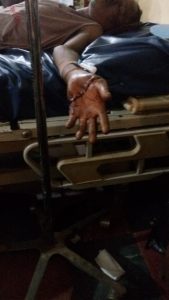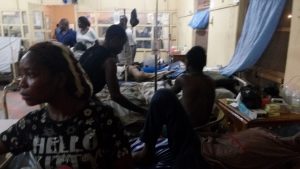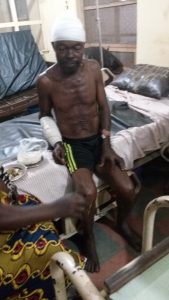Guest post by Chijioke Ngobili
—
On Monday, 25th April, 2016, just before it was 7am, the unarmed indigenes of Ukpabi-Nimbo, Uzo-Uwani LG of Enugu State, South-eastern Nigeria were attacked with machetes, guns and other dangerous weapons. It was a bloodbath. The news filtered in and pictures of mangled bodies were shared on social media. My Facebook newsfeed began giving me snippets of the carnage around 1pm on 25th April, 2016. I read and searched out more information on it and I was embittered by what I read—some false, some exaggerated and some compellingly true. But then I had begun considering a travel to Nsukka.
On 26th April, 2016, by 6.20pm, I was at the Bishop Shanahan Hospital, Nsukka situated along Enugu Road. I asked the security men that I be directed to the ward where the victims of the Fulani massacre were, and they did. On entering this very ward, anguish and sorrow greeted me with their smell and wisps. One must have to double his guts to endure the sight of blood, deep cuts and wounds. I did before I entered a particular partition of the two wards.
The doctors, nurses were very busy and proactive in managing an overwhelming situation. The victims and their caregivers looked at me with suspicion. They were very careful and looked traumatized. I spoke in Igbo immediately and introduced myself mentioning my place of work so as to douse the growing tension and discomfort. I realised that it would be wise if I limited my speaking to one or two persons as not to attract the attentions of the doctors, nurses and other people in there, else I may be unable to extract any information at all since I’m no journalist by profession.
Samuel Uzoh (pictured above) was the first victim I tried speaking to. He had a fiery temper. He understandably barked at me when I tried asking him questions directly: “So, when you get the answer, what will you do with it?” When I tried to explain, he ignored me and continued eating the food his sister was feeding him. It was this sister of his—who declined giving her own name—that told me her brother’s name and gave me a sketchy report of the horrendous incident before withdrawing from saying more when she saw me getting out my phone to record some of the things she said. Despite his massive wounds, Samuel’s mouth remained sharp and mind alert. You need not know that he engaged the herdsmen who wielded machetes and guns, and paid for it. This was his brief story: He is a farmer. He was going to early morning farming around 6am when the marauders attacked him. He refused to submit to death. Instead, he fought and lived to sustain the wounds on his head and right arm.
When I looked to my left, on the other row of the hospital beds, I saw a much younger man laid on the bed with a young woman of his age looking over him. I approached them. The young lady was more friendly and welcoming. She struck as more exposed and educated judging from her response in good English and the unexpected courtesy she showed me after I had introduced myself.
Celestine Ajogwu (pictured below) was the name of her brother. I had asked if she was Celestine’s wife. “No. We are siblings from same father but not same mother. He is Celestine Ajogwu while I am Chioma Ezugwu”, she said. His brother’s left palm was cut with a machete by the Fulani herdsmen as can be seen in the picture. His head and jaw were equally hit with a machete as he lost three teeth in the process. Celestine managed to say a few things to me despite the badly hurt mouth that affected his speaking. His sister, Chioma, helped him to narrate to me how it all happened in their town of Nimbo in the wee hours of April 25th, 2016: “I was in Onicha, Anambra State where I live when they called me to come home; that our community was raided”, she said. “I didn’t even know that my brother was among the victims until I saw people being carried out of the vehicle. I was shocked to speechlessness on seeing him in his very bad condition”.

Chioma then took me down memory lane as far back as 2006 when their traditional leader of Nimbo community naïvely thought that Fulani herdsmen could be pacified with money as to leave his people in peace, only for them to tell him how they desired to acquire more lands. “The man who is our Igwe (name withheld) was away from us for a long time. He returned from Abroad (maybe US/UK) and became the Igwe following some traditional succession”, Chioma revealed. “In 2006 or thereabout, after he had been deluged with complaints from our people on the destruction of farmlands by the Fulani herds of cattle, he invited the Fulani herdsmen and asked them how much he can give them as to vacate from our community entirely and in peace. The Fulani Cattle breeders asked for 10 million naira and our Igwe raised it and gave them, only for them to return to their excessive grazing with the claims that we have a wide expanse of lands”, Chioma told me. Since that year 2006 when the Igwe made that offer and before then, “…it has been endless conflicts between our people and the Fulani cattle breeders”, she emphasised.
Recently, the Fulani herdsmen wrote a letter to the Igwe, informing him with untold bravado, of their intention to revenge the clash they have been having with the men of the community on the issue of excessive grazing. On learning that, the Igwe alerted the State and Local authorities. Policemen were mobilised to the town and stationed to protect the people. But something suspicious and conspiratorial mixed up to birth the eventual misfortune.
Celestine Ajogwu told me himself: “I had slept the night before seeing the policemen around our community and so felt relaxed. Early in the morning, around 6am, I had woken to move out. I saw unusually numerous men dressed in black thinking they were the security men I saw the other night. But when I noticed they were blindfolded, I grew afraid and ran back to my house not knowing they had seen me. Some of them came to my house and struggled with me before dragging me out to butcher. In the process, I fell down to the ground pretending to be dead. That was when they left me alone thinking I had died”. Chioma took over to straighten the wavy mix of how the indigenes managed to save many lives by escaping an army of numerous marauders. “These Fulani had planned not to raise dust in the killing which is why you can see that many of the victims were mainly butchered and were barely shot with a gun. They planned a smooth ethnic cleansing such that no one around would know what is happening until they are done with the cleansing. But it took one of our men who had woken much earlier to shout out when they struggled with him. The man was coming out with his bike when he saw something unusual about the people they thought were protecting them. With his shouting, people scampered for safety and the killers managed to kill the much they could. My brother, though badly hurt, managed to alert other people he could alert using his phone”.

I also gathered that the Catholic parish priest in the town earlier escaped the carnage even when the killers approached his house and found no one. In all these, something is significant but rarely noticed: The women were barely part of the victims. I checked the five patients in that ward and noticed that they were all men. Chioma had brought this to my attention saying: “Even if women are gathered in hundreds, they would just pass by and leave them. They said it’s the men they are looking for; that it’s our men that have offended them most and refused them on our lands”. On asking the actual number of deaths so far, Chioma said she had been able to count nine dead bodies brought to the morgue with her own eyes despite the conflicting figures thrown about the media. She pointed at a bed adjacent to theirs: “This evening, the man here died and was taken to the morgue. He was old and couldn’t endure the pains of the deep wounds he sustained”. Chioma didn’t clarify to me if the recently dead man added up the dead bodies to 10 or completed them 9. She also reminded me that there were other victims taken to the General Hospital in the same Nsukka; and definitely, other dead bodies will be there too, plus those who may have equally died in the process. She told me how Governor Ifeanyi Ugwuanyi, the governor of their State, visited them and gave them each a hundred thousand naira each, just as the Senator representing Nsukka Senatorial Zone, Chukwuka Utazi gave them fifty thousand naira each; making it a hundred and fifty thousand naira each. (They were 5 patients in that very ward as at 26th evening of April, 2016). Also according to Chioma, the governor paid their bills and informed them that they’d be transferred to University of Nigeria, Teaching Hospital, Ituku-Ozalla between that evening and the next morning.
Celestine and Chioma, in a nutshell, believed that there is a conspiracy somewhere which resulted to the bloodbath. They believed there was an insider who facilitated it even though they refrained from mentioning the people/group they might have suspected. They are right! The constant pulse in that suspicion is this: An enemy served you a threat. You provided a security to avert it, yet the threat became real. So, what actually did the security agents do after all? Why did they leave their station only for the enemies to surface in a space of few hours? Were where those enemies all along? In the bush? Or did they use the same roads you guard to assess the community of Nimbo? Too many questions begged for answers in my mind.
“We can’t even wait for morning to come, so that we can be transferred to Enugu”, Chioma said resolutely. “This place doesn’t seem safe judging from two of the victims in the other ward who couldn’t speak Igbo when the doctors and nurses asked for their names. I am afraid of their body languages and facial expressions so far. They can possibly be informants who consciously got wounded as to keep penetrating our people further”. I left them at 8pm after showing them some little financial gestures. I assured them that I would keep checking on them and that if anyone who gets to learn of their story from me offers anything for them, I’d surely make it reach them.
_____________
Chijioke is a musician, writer and freelance journalist. He wrote from Nsukka.
_____________
Photo credit: Chijioke Ngobili

No Comments to Bloody Morning: The Ukpabi-Nimbo Massacre so far. (RSS Feeds for comments in this post)
No one has commented so far, be the first one to comment!